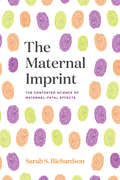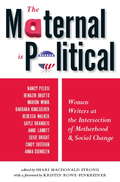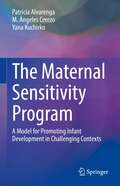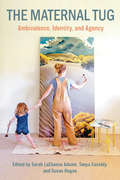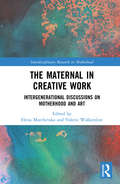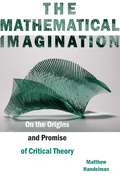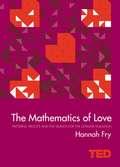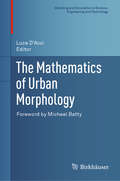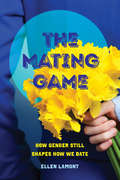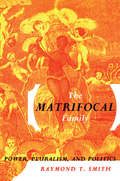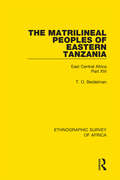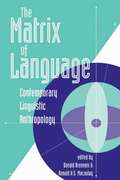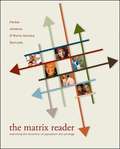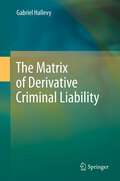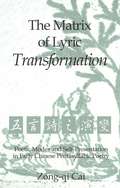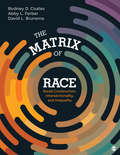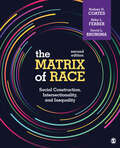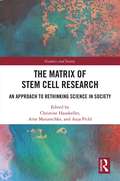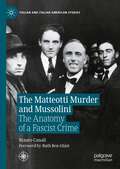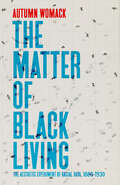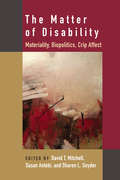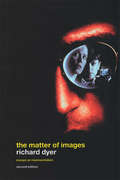- Table View
- List View
The Maternal Imprint: The Contested Science of Maternal-Fetal Effects
by Sarah S. RichardsonLeading gender and science scholar Sarah S. Richardson charts the untold history of the idea that a woman's health and behavior during pregnancy can have long-term effects on her descendants' health and welfare. The idea that a woman may leave a biological trace on her gestating offspring has long been a commonplace folk intuition and a matter of scientific intrigue, but the form of that idea has changed dramatically over time. Beginning with the advent of modern genetics at the turn of the twentieth century, biomedical scientists dismissed any notion that a mother—except in cases of extreme deprivation or injury—could alter her offspring’s traits. Consensus asserted that a child’s fate was set by a combination of its genes and post-birth upbringing. Over the last fifty years, however, this consensus was dismantled, and today, research on the intrauterine environment and its effects on the fetus is emerging as a robust program of study in medicine, public health, psychology, evolutionary biology, and genomics. Collectively, these sciences argue that a woman’s experiences, behaviors, and physiology can have life-altering effects on offspring development. Tracing a genealogy of ideas about heredity and maternal-fetal effects, this book offers a critical analysis of conceptual and ethical issues—in particular, the staggering implications for maternal well-being and reproductive autonomy—provoked by the striking rise of epigenetics and fetal origins science in postgenomic biology today.
The Maternal Imprint: The Contested Science of Maternal-Fetal Effects
by Sarah S. RichardsonLeading gender and science scholar Sarah S. Richardson charts the untold history of the idea that a woman's health and behavior during pregnancy can have long-term effects on her descendants' health and welfare. The idea that a woman may leave a biological trace on her gestating offspring has long been a commonplace folk intuition and a matter of scientific intrigue, but the form of that idea has changed dramatically over time. Beginning with the advent of modern genetics at the turn of the twentieth century, biomedical scientists dismissed any notion that a mother—except in cases of extreme deprivation or injury—could alter her offspring’s traits. Consensus asserted that a child’s fate was set by a combination of its genes and post-birth upbringing. Over the last fifty years, however, this consensus was dismantled, and today, research on the intrauterine environment and its effects on the fetus is emerging as a robust program of study in medicine, public health, psychology, evolutionary biology, and genomics. Collectively, these sciences argue that a woman’s experiences, behaviors, and physiology can have life-altering effects on offspring development. Tracing a genealogy of ideas about heredity and maternal-fetal effects, this book offers a critical analysis of conceptual and ethical issues—in particular, the staggering implications for maternal well-being and reproductive autonomy—provoked by the striking rise of epigenetics and fetal origins science in postgenomic biology today.
The Maternal Imprint: The Contested Science of Maternal-Fetal Effects
by Sarah S. RichardsonLeading gender and science scholar Sarah S. Richardson charts the untold history of the idea that a woman's health and behavior during pregnancy can have long-term effects on her descendants' health and welfare. The idea that a woman may leave a biological trace on her gestating offspring has long been a commonplace folk intuition and a matter of scientific intrigue, but the form of that idea has changed dramatically over time. Beginning with the advent of modern genetics at the turn of the twentieth century, biomedical scientists dismissed any notion that a mother—except in cases of extreme deprivation or injury—could alter her offspring’s traits. Consensus asserted that a child’s fate was set by a combination of its genes and post-birth upbringing. Over the last fifty years, however, this consensus was dismantled, and today, research on the intrauterine environment and its effects on the fetus is emerging as a robust program of study in medicine, public health, psychology, evolutionary biology, and genomics. Collectively, these sciences argue that a woman’s experiences, behaviors, and physiology can have life-altering effects on offspring development. Tracing a genealogy of ideas about heredity and maternal-fetal effects, this book offers a critical analysis of conceptual and ethical issues—in particular, the staggering implications for maternal well-being and reproductive autonomy—provoked by the striking rise of epigenetics and fetal origins science in postgenomic biology today.
The Maternal Is Political: Women Writers at the Intersection of Motherhood and Social Change
by Kristin Rowe-Finkbeiner Shari Macdonald StrongExploring the vital connection between motherhood and social change, The Maternal Is Political features more than 40 powerful, hard-hitting literary essays by women who are striving to make the world a better place for children and families - both their own and other women's - in this country and globally.From the mom deconstructing playground "power games" with her first-grade child, to the mother who speaks out against misogyny during an awkward road trip with her college-age daughter and friends, to the mother of sons worrying about the threat of a future military draft, The Maternal Is Political brings together the voices of women who are transforming the political and social: one child, one babysitter, one peace march at a time.
The Maternal Sensitivity Program: A Model for Promoting Infant Development in Challenging Contexts
by Patrícia Alvarenga M. Ángeles Cerezo Yana KuchirkoThis book presents the Maternal Sensitivity Program (MSP), an eight-session home-delivered intervention designed to enhance overall maternal sensitivity to infant behavior between the third and the tenth month of life using video feedback and live modeling strategies. The intervention was based on successful international programs but was specifically developed to fit the realities and needs of low-income countries, whose public health services rely on scarce human and economic resources. The program aims to promote maternal acknowledgment of infant mental activity and model responses that encourage infants' communication of intentions, needs, desires, and emotions.The first part of the book provides an overview of core theories related to the concept of maternal sensitivity, illustrating how it varies across cultural contexts, and how it is shaped by economic scarcity. The second part of the book presents evidence of the effectiveness of sensitivity-based interventions, describes and provides a rationale for the Maternal Sensitivity Program (MSP), and proposes a framework for training interventionists seeking to implement the program in different contexts. The third part of the book presents the intervention manual, describing in detail the procedures in each of the eight sessions of the program. The Maternal Sensitivity Program: A Model for Promoting Infant Development in Challenging Contexts will be an invaluable resource for developmental psychologists, health care providers, and social workers who work with families in low-income countries and in contexts of social vulnerability and need to implement low-cost interventions to foster healthy child development.
The Maternal Tug: Amblivalence, I dentity, and Agency
by Adams Sarah LaChanceWhile the existence of maternal ambivalence has been evident for centuries, it has only recently been recognized as central to the lived experience of mothering. This accessible, yet intellectually rigorous, interdisciplinary collection demonstrates its presence and meaning in relation to numerous topics such as pregnancy, birth, Caesarean sections, sleep, self-estrangement, helicopter parenting, poverty, environmental degradation, depression, anxiety, queer mothering, disability, neglect, filicide and war rape. Its authors deny the assumption that mothers who experience ambivalence are bad, evil, unnatural, or insane. Moreover, historical records and cross-cultural narratives indicate that maternal ambivalence appears in a wide range of circumstances; but that it becomes unmanageable in circumstances of inequity, deprivation and violence. From this premise, the authors in this collection raise imperative ethical, social, and political questions, suggesting possibilities for vital cultural transformations. These candid explorations demand we rethink our basic assumptions about how mothering is experienced in everyday life.
The Maternal in Creative Work: Intergenerational Discussions on Motherhood and Art (Interdisciplinary Research in Motherhood)
by Valerie Walkerdine Elena MarchevskaThe Maternal in Creative Work examines the interrelation between art, creativity and maternal experience, inviting international artists, theorists and cultural workers to discuss their approaches to the central feminist question of the relation between maternity, generation and creativity. This edited collection explores various modes and forms of art practice which look at mothers as subjects and as artists of the maternal experience, and how the creative practice is used to accept, negotiate, resist or challenge traditional conceptions of mothering. The book brings together some of the major projects of maternal art from the last two decades and opens up new ways of conceptualizing motherhood as a creative and communicative practice. Chapters include intergenerational discussion of art practices in the 20th and 21st centuries, representations of breastfeeding and infertility in creative projects, the notion of the ‘unfit mother’ and childlessness, together with the experiences of women and men that take on maternal identities through many forms of kinship and social mothering. The Maternal in Creative Work will be essential reading for interdisciplinary students and scholars in cultural studies, gender studies and art theory and will have wider appeal to audiences interested in maternity, childcare, creativity and psychoanalysis.
The Mathematical Imagination: On the Origins and Promise of Critical Theory
by Matthew HandelmanThis book offers an archeology of the undeveloped potential of mathematics for critical theory. As Max Horkheimer and Theodor W. Adorno first conceived of the critical project in the 1930s, critical theory steadfastly opposed the mathematization of thought. Mathematics flattened thought into a dangerous positivism that led reason to the barbarism of World War II. The Mathematical Imagination challenges this narrative, showing how for other German-Jewish thinkers, such as Gershom Scholem, Franz Rosenzweig, and Siegfried Kracauer, mathematics offered metaphors to negotiate the crises of modernity during the Weimar Republic. Influential theories of poetry, messianism, and cultural critique, Handelman shows, borrowed from the philosophy of mathematics, infinitesimal calculus, and geometry in order to refashion cultural and aesthetic discourse.Drawn to the austerity and muteness of mathematics, these friends and forerunners of the Frankfurt School found in mathematical approaches to negativity strategies to capture the marginalized experiences and perspectives of Jews in Germany. Their vocabulary, in which theory could be both mathematical and critical, is missing from the intellectual history of critical theory, whether in the work of second generation critical theorists such as Jürgen Habermas or in contemporary critiques of technology. The Mathematical Imagination shows how Scholem, Rosenzweig, and Kracauer’s engagement with mathematics uncovers a more capacious vision of the critical project, one with tools that can help us intervene in our digital and increasingly mathematical present.
The Mathematics of Love
by Hannah FryPart of the TED series: The Mathematics of Love There is no topic that attracts more attention-more energy and time and devotion- than love. Love, like most things in life, is full of patterns. And mathematics is ultimately the study of patterns. In her book The Mathematics of Love - and TEDxTalk of the same name - Dr. Hannah Fry takes the audience on a fascinating journey through the patterns that define our love lives, tackling some of the most common yet complex questions pertaining to love: What's the chance of us finding love? What's the chance that it will last? How does online dating work, exactly? When should you settle down? How can you avoid divorce? When is it right to compromise? Can game theory help us decide whether or not to call? From evaluating the best strategies for online dating to defining the nebulous concept of beauty, Dr. Fry proves-with great insight, wit and fun- that maths is a surprisingly useful tool to negotiate the complicated, often baffling, sometimes infuriating, always interesting, patterns of love.
The Mathematics of Urban Morphology (Modeling and Simulation in Science, Engineering and Technology)
by Michael Batty Luca D'AcciThis edited volume provides an essential resource for urban morphology, the study of urban forms and structures, offering a much-needed mathematical perspective. Experts on a variety of mathematical modeling techniques provide new insights into specific aspects of the field, such as street networks, sustainability, and urban growth. The chapters collected here make a clear case for the importance of tools and methods to understand, model, and simulate the formation and evolution of cities.The chapters cover a wide variety of topics in urban morphology, and are conveniently organized by their mathematical principles. The first part covers fractals and focuses on how self-similar structures sort themselves out through competition. This is followed by a section on cellular automata, and includes chapters exploring how they generate fractal forms. Networks are the focus of the third part, which includes street networks and other forms as well. Chapters that examine complexity and its relation to urban structures are in part four.The fifth part introduces a variety of other quantitative models that can be used to study urban morphology. In the book’s final section, a series of multidisciplinary commentaries offers readers new ways of looking at the relationship between mathematics and urban forms.Being the first book on this topic, Mathematics of Urban Morphology will be an invaluable resource for applied mathematicians and anyone studying urban morphology. Additionally, anyone who is interested in cities from the angle of economics, sociology, architecture, or geography will also find it useful."This book provides a useful perspective on the state of the art with respect to urban morphology in general and mathematics as tools and frames to disentangle the ideas that pervade arguments about form and function in particular. There is much to absorb in the pages that follow and there are many pointers to ways in which these ideas can be linked to related theories of cities, urban design and urban policy analysis as well as new movements such as the role of computation in cities and the idea of the smart city. Much food for thought. Read on, digest, enjoy." From the foreword by Michael Batty
The Mating Game: How Gender Still Shapes How We Date
by Ellen LamontDespite enormous changes in patterns of dating and courtship in twenty-first-century America, contemporary understandings of romance and intimacy remain firmly rooted in age-old assumptions of gender difference. These tenacious beliefs now vie with cultural messages of gender equality that stress independence, self-development, and egalitarian practices in public and private life.Through interviews with heterosexual and LGBTQ individuals, Ellen Lamont’s The Mating Game explores how people with diverse sexualities and gender identities date, form romantic relationships, and make decisions about future commitments as they negotiate uncertain terrain fraught with competing messages about gender, sexuality, and intimacy.
The Matrifocal Family: Power, Pluralism and Politics
by Raymond T. SmithThe essays in this collection focus attention on the enormous contribution made by women in maintaining family relations in situations of both racial and gender domination.
The Matrilineal Peoples of Eastern Tanzania (Zaramo, Luguru, Kaguru, Ngulu): East Central Africa Part XVI
by T. O. BeidelmanRoutledge is proud to be re-issuing this landmark series in association with the International African Institute. The series, published between 1950 and 1977, brings together a wealth of previously un-co-ordinated material on the ethnic groupings and social conditions of African peoples. Concise, critical and (for its time) accurate, the Ethnographic Survey contains sections as follows: Physical Environment Linguistic Data Demography History & Traditions of Origin Nomenclature Grouping Cultural Features: Religion, Witchcraft, Birth, Initiation, Burial Social & Political Organization: Kinship, Marriage, Inheritance, Slavery, Land Tenure, Warfare & Justice Economy & Trade Domestic Architecture Each of the 50 volumes will be available to buy individually, and these are organized into regional sub-groups: East Central Africa, North-Eastern Africa, Southern Africa, West Central Africa, Western Africa, and Central Africa Belgian Congo. The volumes are supplemented with maps, available to view on routledge.com or available as a pdf from the publishers.
The Matrix Of Language: Contemporary Linguistic Anthropology
by Donald BrenneisThis book presents a range of methodological approaches and case studies that illustrate the interconnection of language, culture, and social practice. It is useful for anyone exploring the relation of language to psychology, political theory, feminist studies, and literature and folklore.
The Matrix Reader: Examining the Dynamics of Oppression and Privilege
by Abby L. Ferber Christina M. Jimenez Andrea O'Reilly Herrera Dena R. SamuelsWritten by four authors from different disciplinary backgrounds, this reader promotes a commitment to an intersectional approach to teaching race, class, gender and sexuality. Unlike most books of its kind, it highlights the duality of privilege and oppression and the effects that race, gender, and sexuality have on our lives. This reader includes poems, reflective literary prose, historical events and documents, images drawn from the media, contemporary statistics of inequalities, visual images, and tools that empower students to become agents for social change.
The Matrix of Derivative Criminal Liability
by Gabriel HallevyDerivative criminal liability includes inchoate offenses (criminal attempt, conspiracy, preparatory offenses, etc.), complicity (joint perpetration, perpetration through another, incitement, solicitation, accessoryship, etc.), organized crime, natural and probable consequences liability, post-crime aid, enterprise liability, terrorism and terrorist infrastructure, and many more forms of criminal liability, clearly making it a major pillar of modern criminal law. Although derivative criminal liability affects countries worldwide, there is still no general legal theory that covers this issue. The objective of the present book is to develop a comprehensive, general, legally sophisticated, and at the same time practical theory of derivative criminal liability. The book emphasizes the practicality of the theory to enable courts, lawyers, legislators, attorneys, students, and academics to apply it in their daily professional occupations.
The Matrix of Lyric Transformation: Poetic Modes and Self-Presentation in Early Chinese Pentasyllabic Poetry (Michigan Monographs In Chinese Studies #75)
by Zong-qi Cai Zong-qu CaiPentasyllabic poetry has been a focus of critical study since the appearance of the earliest works of Chinese literary criticism in the Six Dynasties period. Throughout the subsequent dynasties, traditional Chinese critics continued to examine pentasyllabic poetry as a leading poetic type and to compile various comprehensive anthologies of it. The Matrix of Lyric Transformation enriches this tradition, using modern analytical methods to explore issues of self-expression and to trace the early formal, thematic, and generic developments of this poetic form. Beginning with a discussion of the Yüeh-fu and ku-shih genres of the Han period, Cai Zong-qi introdues the analytical framework of modes from Western literary criticism to show how the pentasyllabic poetry changed over time. He argues that changing practices of poetic composition effected a shift from a dramatic mode typical of folk compositions to a narrative mode and finally to lyric and symbolic modes developed in literati circles.
The Matrix of Race: Social Construction, Intersectionality, And Difference
by Abby L. Ferber David L. Brunsma Rodney D. CoatesThe Matrix of Race, for race and ethnic relations courses, is written by three leading scholars -- Rodney D. Coates, David L. Brunsma, and Abby L. Ferber -- and reflects a very contemporary way of looking at race, minorities, and intergroup relations. Older texts use a "categorical" approach and feature a series of chapters that examine one minority group at a time (African Americans, Latino/a Americans, Asian Americans, Native Americans, etc.). Newer texts designed within the last 5-10 years are more likely to be organized topically, discuss various racial and ethnic minorities within the context of these topics, and use the most current theories and perspectives in this field. The Matrix of Race is built around these core ideas: -Race is a both a social construction and a social institution -Race is intersectional--it is embedded within other statuses (such as gender, social class, sexuality) -Concepts of race change over time and as we move from one physical location to another -We are all active agents in upholding, reproducing, or resisting constructions of race.
The Matrix of Race: Social Construction, Intersectionality, and Inequality
by Abby L. Ferber David L. Brunsma Rodney D. CoatesTopically organized and drawing on the most up-to-date theories and perspectives in the field, The Matrix of Race, Second Edition examines the intersecting, multilayered identities of contemporary society, and the powerful social institutions that shape our understanding of race. Leading scholars Rodney D. Coates, Abby L. Ferber, and David L. Brunsma use a storytelling approach to illustrate how racial inequality has produced drastically different opportunities, experiences, and outcomes within all aspects of life, from schools, housing, medicine, and workplaces to our criminal justice and political systems. Readers are equipped with a historical perspective, theoretical framework, and diverse view of race and racial ideologies so that they can confidently participate and contribute to dialogues and practices that will ultimately dismantle race and racial structures. This title is accompanied by a complete teaching and learning package. Contact your SAGE representative to request a demo. Digital Option / Courseware SAGE Vantage is an intuitive digital platform that delivers this text’s content and course materials in a learning experience that offers auto-graded assignments and interactive multimedia tools, all carefully designed to ignite student engagement and drive critical thinking. Built with you and your students in mind, it offers simple course set-up and enables students to better prepare for class. Assignable Video with Assessment Assignable video (available with SAGE Vantage) is tied to learning objectives and curated exclusively for this text to bring concepts to life. Watch a sample video now. LMS Cartridge: Import this title’s instructor resources into your school’s learning management system (LMS) and save time. Don’t use an LMS? You can still access all of the same online resources for this title via the password-protected Instructor Resource Site. Learn more.
The Matrix of Race: Social Construction, Intersectionality, and Inequality
by Abby L. Ferber David L. Brunsma Rodney D. CoatesTopically organized and drawing on the most up-to-date theories and perspectives in the field, The Matrix of Race, Second Edition examines the intersecting, multilayered identities of contemporary society, and the powerful social institutions that shape our understanding of race. Leading scholars Rodney D. Coates, Abby L. Ferber, and David L. Brunsma use a storytelling approach to illustrate how racial inequality has produced drastically different opportunities, experiences, and outcomes within all aspects of life, from schools, housing, medicine, and workplaces to our criminal justice and political systems. Readers are equipped with a historical perspective, theoretical framework, and diverse view of race and racial ideologies so that they can confidently participate and contribute to dialogues and practices that will ultimately dismantle race and racial structures. This title is accompanied by a complete teaching and learning package. Contact your SAGE representative to request a demo. Digital Option / Courseware SAGE Vantage is an intuitive digital platform that delivers this text’s content and course materials in a learning experience that offers auto-graded assignments and interactive multimedia tools, all carefully designed to ignite student engagement and drive critical thinking. Built with you and your students in mind, it offers simple course set-up and enables students to better prepare for class. Assignable Video with Assessment Assignable video (available with SAGE Vantage) is tied to learning objectives and curated exclusively for this text to bring concepts to life. Watch a sample video now. LMS Cartridge: Import this title’s instructor resources into your school’s learning management system (LMS) and save time. Don’t use an LMS? You can still access all of the same online resources for this title via the password-protected Instructor Resource Site. Learn more.
The Matrix of Stem Cell Research: An Approach to Rethinking Science in Society (Genetics and Society)
by Christine Hauskeller Arne Manzeschke Anja PichlStem cell research has been a problematic endeavour. For the past twenty years it has attracted moral controversies in both the public and the professional sphere. The research involves not only laboratories, clinics and people, but ethics, industries, jurisprudence, and markets. Today it contributes to the development of new therapies and affects increasingly many social arenas. The matrix approach introduced in this book offers a new understanding of this science in its relation to society. The contributions are multidisciplinary and intersectional, illustrating how agency and influence between science and society go both ways. Conceptually, this volume presents a situated and reflexive approach for philosophy and sociology of the life sciences. The practices that are part of stem cell research are dispersed, and the concepts that tie them together are tenuous; there are persistent problems with the validation of findings, and the ontology of the stem cell is elusive. The array of applications shapes a growing bioeconomy that is dependent on patient donations of tissues and embryos, consumers, and industrial support. In this volume it is argued that this research now denotes not a specific field but a flexible web of intersecting practices, discourses, and agencies. To capture significant parts of this complex reality, this book presents recent findings from researchers, who have studied in-depth aspects of this matrix of stem cell research. This volume presents state-of-the-art examinations from senior and junior scholars in disciplines from humanities and laboratory research to various social sciences, highlighting particular normative and epistemological intersections. The book will appeal to scholars as well as wider audiences interested in developments in life science and society interactions. The novel matrix approach and the accessible case studies make this an excellent resource for science and society courses.
The Matteotti Murder and Mussolini: The Anatomy of a Fascist Crime (Italian and Italian American Studies)
by Mauro CanaliThis much-awarded work by one of Italy’s most esteemed historians of fascism, Mauro Canali, is now available in English translation. Based on a wealth of previously unavailable judicial and archival material, it sheds light on how fascism exercised power through violence and corruption from the very beginning. The book reveals the motives that led Mussolini to order the kidnapping and murder of Socialist leader Giacomo Matteotti in 1924, a turning point in Mussolini’s grasp of total power in Italy. Canali further explores the corrupt dealings between the Mussolini family and the American Sinclair Oil Company that Matteotti had intended to denounce in the Italian parliament the day after his death.
The Matter of Black Living: The Aesthetic Experiment of Racial Data, 1880–1930
by Autumn WomackExamining how turn-of-the-century Black cultural producers’ experiments with new technologies of racial data produced experimental aesthetics. As the nineteenth century came to a close and questions concerning the future of African American life reached a fever pitch, many social scientists and reformers approached post-emancipation Black life as an empirical problem that could be systematically solved with the help of new technologies like the social survey, photography, and film. What ensued was nothing other than a “racial data revolution,” one which rendered African American life an inanimate object of inquiry in the name of social order and racial regulation. At the very same time, African American cultural producers and intellectuals such as W. E. B. Du Bois, Kelly Miller, Sutton Griggs, and Zora Neale Hurston staged their own kind of revolution, un-disciplining racial data in ways that captured the dynamism of Black social life.The Matter of Black Living excavates the dynamic interplay between racial data and Black aesthetic production that shaped late nineteenth-century social, cultural, and literary atmosphere. Through assembling previously overlooked archives and seemingly familiar texts, Womack shows how these artists and writers recalibrated the relationship between data and Black life. The result is a fresh and nuanced take on the history of documenting Blackness. The Matter of Black Living charts a new genealogy from which we can rethink the political and aesthetic work of racial data, a task that has never been more urgent.
The Matter of Disability: Materiality, Biopolitics, Crip Affect (Corporealities: Discourses Of Disability)
by David T. Mitchell Sharon L. Snyder Susan AntebiThe Matter of Disability returns disability to its proper place as an ongoing historical process of corporeal, cognitive, and sensory mutation operating in a world of dynamic, even cataclysmic, change. The book’s contributors offer new theorizations of human and nonhuman embodiments and their complex evolutions in our global present, in essays that explore how disability might be imagined as participant in the “complex elaboration of difference,” rather than something gone awry in an otherwise stable process. This alternative approach to materiality sheds new light on the capacities that exist within the depictions of disability that the book examines, including Spider-Man, Of Mice and Men, and Bloodchild.
The Matter of Images: Essays on Representations
by Richard DyerNow published in a revised second edition, The Matter of Images searches through the resonances of the term ‘representation’, analysing images in terms of why they matter, what they are made of, and the material realities they refer to. Richard Dyer’s analyses consider representations of ‘out’ groups and traditionally dominant groups alike, and encompass the eclectic texts of contemporary culture, from queers to straights, political correctness, representations of Empire and films including Gilda, Papillon and The Night of the Living Dead. Essays new to the second edition discuss Lillian Gish as the ultimate white movie star, the representation of whiteness in the South in Birth of a Nation, and society’s fascination with serial killers. The Matter of Images is distinctive in its commitment to writing politically about contemporary culture, while insisting on the importance of understanding the formal qualities and complexity of the images it investigates.
